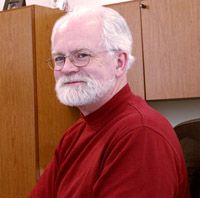New Dual-Degree Program Offered
 |
| Dr. Julius Dewald |
The Northwestern University Graduate School now offers a combined DPT (Doctor in Physical Therapy)/PhD program supported by a new interdisciplinary training grant from the National Institute of Biomedical Imaging and Bioengineering (NIBIB) and the Feinberg School of Medicine (FSM). Julius P.A. Dewald, PT, PhD, professor and chair of the Department of Physical Therapy and Human Movement Sciences, is the principal investigator on the T32 grant, which provides funding for two training slots this year and up to six by the fifth grant year.
“The educational program combines training in the neurosciences, engineering, and physical therapy,” says Dr. Dewald. “Students in this track will understand not only how to apply sophisticated robotics in physical therapy for movement disorders but also the engineering behind the equipment they use.”
For example, people with hemiparetic stroke show a characteristic abnormal coupling of shoulder abduction and elbow flexion. Integrated with a harness to hold the patient’s arm, a robotic system can be programmed to make patients feel as if they are moving their arms in zero gravity, in normal gravity, or anywhere in between. “We can literally bring them from outer space down to earth,” says Dr. Dewald. Patients observe their movements on a computer screen in three dimensions. That virtual environment can also be programmed with simulated objects of different weights that patients see on the screen and feel through haptic forces generated by the robot. Haptics refers to feedback to the brain and central nervous system through the sense of touch.
“While the degree of disability varies from patient to patient, the past 20 years of research in stroke rehabilitation shows that a great deal of commonality exists in the types of movement deficits patients have,” explains Dr. Dewald. “By varying the haptic forces according to the individual’s needs, we can help them decouple the abnormal muscle synergies and restore normal movement.”
The idea for the training program came from Dr. Dewald’s experiences as a member of the biomedical engineering faculty. “Many people in biomedical engineering have interests in rehabilitation medicine,” he says. “I thought, why not combine that with clinical training?”
He discussed the idea with Matt Glucksberg, PhD, chair of biomedical engineering at the McCormick School of Engineering and Applied Science, who supported the concept. Dr. Dewald’s biomedical engineering graduate student, Theresa Sukal, DPT, is the first student on the DPT/PhD track and will be supported by the grant while she finishes her PhD thesis. Her progress through the program was cited in the grant application to the NIBIB.
The model is similar to the Medical Scientist Training Program, the Feinberg School’s combined MD/PhD program. Students begin with two years of studies in biomedical engineering, mechanical engineering, or electrical engineering and computer science at the McCormick School, followed by the three-year doctor of physical therapy curriculum at the Feinberg School, then return to the engineering school for another two years to complete their PhD thesis projects. Like MD/PhD students, they will receive full tuition credit and a stipend for the duration of their DPT education from FSM.
“Ours is the only program of its kind in the country,” says Dr. Dewald. “I believe this is the future for doctors of physical therapy who want to become leaders in the field of rehabilitation sciences.”






